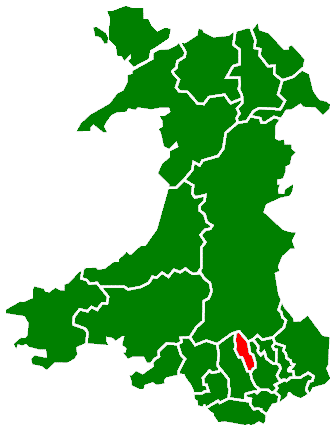


“The Welsh language needs to be a part of the Green movement in the same way as the language was an integral of the industrial revolution in Merthyr Tydfil in the 18th and 19th centuries.”
That was the challenge set out by Hywel Davies, editor of Y Papur Gwyrdd (The Green Paper), a Welsh language magazine about green issues, when addressing a Cymdeithas yr Iaith Gymraeg (Welsh Language Society) Rally in Merthyr on Saturday, October 24.
“It is vital that Welsh should be part of the Green Economy, that it should be a community language offering new ideas, not the recipient of ideas translated from another language,” he continued. “A linguistic rejuvenation should be part of an environmental revival.”
In the mid-19th century, Merthyr, perhaps the greatest industrial towns of the world, was predominantly Welsh-speaking. Welsh cultural was vibrant as people from all over Wales flocked to the town's ironworks and Welsh language newspapers prospered.
But as the young novelist Catrin Dafydd pointed out, today Merthyr, unlike its neighbouring authorities, was notable for its lack of support for Welsh language education and culture.
Plaid Cymru President and former MP and former member of the Welsh Assembly, Dafydd Wigley, who once lived in the town and had been involved in the campaign to establish the first Welsh medium primary school in the borough, recalled a Cymdeithas yr Iaith campaign in the early 1970s when 40 per cent of the people of the town signed a petition in support of Welsh language education.
“It was a campaign first to raise awareness of the language, then to campaign for Welsh medium education,” he said. “The good will towards the language is greater than ever – but so is the prejudice among some politicians,” he said.
Over 500 pupils
Ysgol Santes Tudful, the Welsh primary school in the town, is full to overflowing with around 500 pupils. In spite of the demand, there is still only one other Welsh medium primary school in the borough, at the other end of the valley, in Quakers Yard, also full to overflowing and due to be moved to another building. But there will still only be two Welsh primary schools in the borough of Merthyr Tydfil.
A new “Welsh Language Act” is in the process of being formed, but Mr Wigley drew the attention of the members to the fact that it was unlikely to be adequate and even more so that sections of the 1993 Language Act still had to be implemented.
Brandished bills he had received from the electricity provider SWALEC, he noted that they contained only the briefest of paragraphs in Welsh. “Morrison's, the supermarket chain, has just opened a new store in Caernarfon without a word of Welsh anywhere,” he said.
“I wrote, asking whether they did not want the business of 80 per cent of the population. The person responsible had no idea of the “Welsh Language Act” nor that Caernarfon was a predominantly Welsh-speaking town. We need to campaign vigorously and to take the people with us.”
After the Rally, members of Cymdeithas yr Iaith marched to the council offices where a letter and petition was presented demanding
– the provision of adequate Welsh language education;
– the provision of Welsh language out-of-school activities for all ages;
– to develop administrative departments to ensure that Welsh is given consideration in all aspects of the council's work, internally and externally;
– and to consider the role of the council in normalising Welsh in the district and to act upon it.
(voir le site) of Cymdeithas yr Iaith Gymraeg in English. (voir le site) of the same in Welsh.